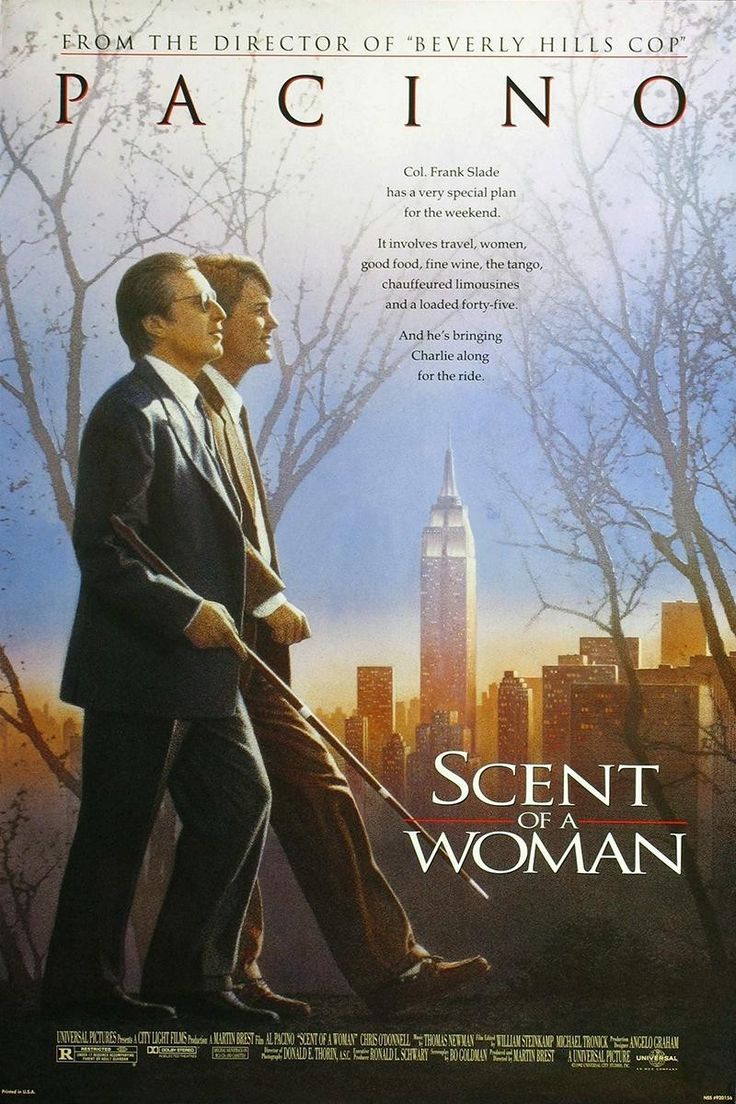“Scent of a Woman” (1992): Al Pacino’s Tour de Force and a Long-Overdue Oscar – Film Review

Martin Brest’s “Scent of a Woman” (1992) is a film that has etched itself into the annals of cinematic history, primarily for Al Pacino’s unforgettable portrayal of Lieutenant Colonel Frank Slade, a blind, retired Army officer. The film, a journey of self-discovery, redemption, and the exploration of human relationships, is often discussed not just for its narrative depth and directorial finesse, but also for its role in finally securing Pacino an Academy Award for Best Actor—a recognition many believe was long overdue.
The Genesis and Production Intricacies
Adapted from the 1974 Italian film “Profumo di donna,” the journey of bringing “Scent of a Woman” to the American screen was fraught with challenges, including script rewrites and casting hurdles. The final screenplay, penned by Bo Goldman, transformed the narrative to fit the American context, introducing the character of Charlie Simms (played by Chris O’Donnell) as a counterbalance to Pacino’s Slade, thereby creating a poignant dynamic that drives the film.
Behind the scenes, Pacino’s dedication to authentically portraying a blind man was nothing short of remarkable. Reports indicate he spent considerable time with clients and staff at the New York Institute for the Blind to understand the nuances of blindness. This meticulous preparation underscores Pacino’s commitment to his craft and contributed significantly to the film’s authenticity and emotional impact.
Pacino’s Performance: A Masterclass in Acting
In “Scent of a Woman,” Pacino delivers what is arguably one of the finest performances of his career. His portrayal of Slade is a complex amalgamation of bitterness, charisma, vulnerability, and defiance against life’s injustices. Pacino’s Slade is not just a character; he is a force of nature—commanding yet broken, ferocious yet tender. The actor’s ability to convey profound emotion through Slade’s blindness is a testament to his skill and dedication.
The film’s most iconic moment, the Tango scene, is a masterful display of Pacino’s range. Without the benefit of Slade’s sight, Pacino relies on posture, movement, and facial expressions to communicate the character’s emotions, creating an unforgettable cinematic moment that transcends the narrative itself.
The Quest for Pacino’s Oscar
“Scent of a Woman” came at a pivotal moment in Al Pacino’s career. Despite delivering powerhouse performances in films like “The Godfather” Parts I and II and “Dog Day Afternoon,” Pacino had not received an Oscar. His portrayal of Frank Slade was seen by many as the Academy’s opportunity to rectify this oversight. The film became a vehicle for recognizing Pacino’s illustrious career, with his role as Slade offering the perfect amalgamation of intensity and sensitivity that the Academy often seeks in award-winning performances.
This perspective is further bolstered by the film’s critical and commercial success, along with the awards circuit buzz that positioned Pacino as the frontrunner for the Best Actor Oscar. When he finally won, it was a moment of vindication not just for Pacino but for his fans and peers who believed his transformative performances had long deserved this level of acknowledgment.
A Broader Look at the Film’s Impact
While Pacino’s performance is undeniably the film’s centerpiece, “Scent of a Woman” also offers a rich narrative filled with themes of integrity, courage, and the impact of mentorship. Charlie Simms, as portrayed by Chris O’Donnell, provides a compelling narrative arc of growth and moral fortitude, mirroring the audience’s journey of understanding and empathy towards Slade.
Director Martin Brest’s handling of the film’s pacing and emotional beats showcases his ability to blend drama and humor, ensuring that “Scent of a Woman” is not just a character study but a story with universal appeal. The film’s score, composed by Thomas Newman, further enhances its emotional landscape, adding layers of depth to the storytelling.
Reflections on “Scent of a Woman”
“Scent of a Woman” remains a significant film, not only for its contribution to Al Pacino’s legacy but also for its exploration of themes that touch on the very essence of what it means to live a life of honor and purpose. The film’s production, marked by Pacino’s immersive preparation and the filmmakers’ commitment to authenticity, created a cinematic experience that resonates with audiences even decades after its release.
In looking back at “Scent of a Woman,” it is clear that while the film served as a long-overdue acknowledgment of Pacino’s immense talent, it also stands on its own as a poignant, beautifully crafted piece of cinema that challenges, entertains, and inspires. Through the lens of Frank Slade’s journey, the film invites viewers to confront their own perceptions of disability, redemption, and the power of the human spirit to overcome adversity.




